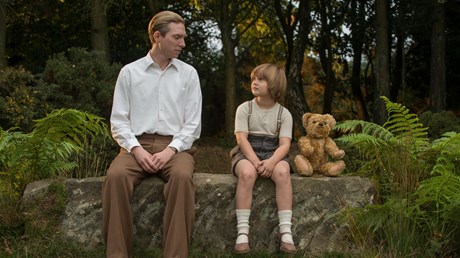Fox’s new A. A. Milne biopic is more Eeyore than Tigger—but maybe that’s a good thing.

“Surely this is the happiest young boy on earth,” chirps the narrator of a newsreel.
He is speaking of Christopher Robin, the son of A. A. Milne, subject and first recipient of the stories of the Hundred Acre Wood. The newsreel narrator, like the adoring fans of Winnie the Pooh he describes, can perhaps be forgiven for not sensing the horrible cruelty in telling an unhappy child that he ought to be joyful. But then Christopher’s father, who knows all too well that the stories were forged as a desperate attempt to connect to his hurting, lonely child, drives the knife in just a little deeper: “You’re the luckiest boy in the world …”
Bitterness is not that hard to capture in film. Bittersweetness is a more difficult quality to embody. Doing so effectively, however, is one of several difficult things that Goodbye Christopher Robin accomplishes, even if it struggles at times to figure out what and who its story is about.
Goodbye opens late in Milne’s life, after he has already written the Pooh books. Milne (Domhnall Gleeson) and his wife, Daphne (Margot Robbie), receive a correspondence with some upsetting news. Distraught, he walks through the woods where the stories were born, but they provide no solace. The film then flashes back in time to one of Milne’s more traumatic memories of World War I.
The first act of the film revolves around Milne’s brittle condition after his war experience. He wants to write a book against war, and nobody thinks that is a good idea. Daphne sarcastically dismisses her husband’s crusade by saying: “You know what a book against war is like? It’s like a book against Wednesdays.” You may not like wars or Wednesdays, she argues, …
Source: Christianity Today Most Read